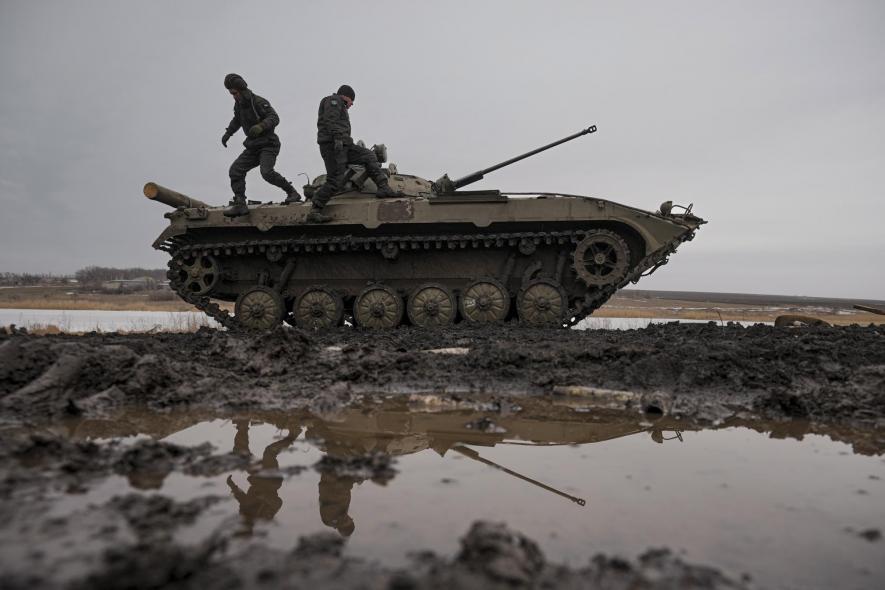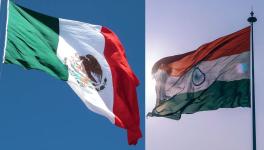The Ukraine War: Where Are the Trees?

Image for representational purpose. Credit: AP News
The Ukrainian War has underlined three realities. One, the Cold War has not ended. It merely went into hibernation for a few years. Two, nationalism is a luxury that only big nations can entertain; small countries may try it only to risk their survival. And three, the suffering of the ordinary person in war is nobody’s headache. Who cares for the trees when the search is only for the forest?
While conducting research for my book on India’s Partition and the resultant forced migrations, which remain historically unparalleled in scale and time frame, I came across a lament expressed by an ordinary man. He complained that historians and politicians talked only about dates and casualty numbers; seldom did they address the human suffering of losing one’s dear ones or abandoning one’s hearth and home.
Looking at the Russian invasion of Ukraine, which is now in its third week, I see the above lament staring us in the face. Almost all the writings and analyses that have appeared in the media are about the strategic interests of Russia, NATO, and by extension, China, India and every other remotely concerned country. The West’s economic sanctions imposed on Russia will leave no country unaffected before long. But missing in the whole discourse are the common people of Ukraine.
The Indian, Bangladeshi, Pakistani, Sri Lankan, or African press are rightly concerned about the fate of their own people trapped in the crisis zone. But do not ordinary Ukrainians also deserve the same sympathy and concern? They too are someone’s mother, father, sister or brother, or just near and dear ones. War is not a TV serial to be dispassionately watched while sipping a cup of coffee or enjoying a meal.
Writing in the Indian Express, Olha Vorozhbyt, Deputy Editor of the Ukrainian weekly, Ukrayinskyi Tyzhden, said: “I am writing these lines as my country, Ukraine, resisted the first day of full-scale war started by its Slavic neighbour—Russia. I am writing this and still cannot believe in it.... When I close my eyes, trying to rest after 24 hours without sleep, I see images of the father who mourns his son near the apartment block in Chuhuyiv, which Russia attacked the morning before. Among those who died, there were children. It is still difficult to believe that this is what happened to me and my country in the 21st century, in the middle of Europe.”
In Indian politics, the crisis in Ukraine has played out in a bizarre way. When the war started, the politically most crucial state of the country, Uttar Pradesh, was amidst a fierce electoral battle between the ruling Bharatiya Janata Party (BJP) and its challengers led by the Samajwadi Party. Inevitably, the fate of the trapped Indian students in Ukraine figured in the debate. But what was prominently advertised, among other things, was Prime Minister Narendra Modi’s macho image which was indirectly compared with that of strongman President Vladimir Putin.
In one of his electoral rallies, without directly referring to Putin, Modi clarified the point further. He asked his cheering supporters whether they would not respect that daroga (police officer) who effectively wields his stick to maintain peace in the locality or that no-nonsense schoolteacher who wields his cane to ensure order in the classroom. His message was transparent: Strong leaders are always the best bet.
There were two other subtexts of his supporters’ message: nationalism (read, Hindu nationalism) and the dream of reuniting partitioned India (Akhand Bharat). Russian irredentist nationalism (read, Czarist imperialism) and its desire to incorporate Ukraine into the present Russian federation fitted the narrative in every detail.
Even the Indian government’s efforts to bring stranded students back were politicised. It baffles common sense why four ministers were despatched unless one views it from the domestic political angle of earning brownie points for the Modi government. India has a long and accomplished record of rescuing stranded Indians from war zones such as the Gulf War (1990), Lebanon (2006), and Libya (2011). The scale of the first one, in particular, dwarfs by order of ten (1,70,000 to 17,000) the current Ukrainian evacuation.
On the high-profile ministerial trips, journalist Suhasini Haidar, who has covered earlier rescue missions, recalled in her ‘Notebook’ in The Hindu: “The media was tolerated at best, and certainly not encouraged to glorify these missions, which were seen simply as the duty of Indian officers towards their fellow citizens. When we returned, the welcome was perfunctory, with no senior official, let alone minister, there to address returning citizens. Times have changed.”
The war in Ukraine teaches us five things which have a direct bearing on the question of human security. First, somewhat ironically, all nations now must go nuclear because neither non-proliferation nor balance of power theories are seemingly able to ensure international security. Hence, many more will now be inclined to say, let’s try the balance of terror model, which has so far remained only in textbooks in favour of the hierarchical and supposedly rule-based non-proliferation regime.
Second, the United Nations has outlived its utility. The choice now is either to reinvent it by keeping the existing global reality in mind or junk this white elephant altogether and save the money for another better purpose. Pending that grand revamp, the system of Veto should immediately be done away with. Even a child can tell how illogical, unjust and weirdly hegemonic it is, leave alone that it is also a clear violation of the fundamental principles of the United Nations.
Third, in the post-Cold War world, NATO by any reckoning is anachronistic. Its sheer existence is prone to create insecurity in Europe, as is evident from the Ukraine crisis. Its expansion from 12 nations originally to 30 now, and with three countries in the queue, is simply mind-boggling.
Fourth, national security is that holy cow that justifies anything and everything. Its definition is determined by the nation concerned, which effectively means those in power. For example, for John Foster Dulles, hating China was in the United States’ national interest; for Henry Kissinger, loving China was in the national interest. Incidentally, both were Republicans. But they could have been Democrats, for party allegiance is not the issue.
And fifth, all small nations situated next to big powers must watch out for they are never sure when the latter will develop a fancy toward them and gobble them either partly or wholly. All they need to do is claim that they were united under a common rule in the past. The war in Ukraine and the Russian explanation for their invasion have shown that the threat is far more than simply theoretical.
Let us remember what Carl von Clausewitz, the Prussian army officer and military strategist, had to say about war and diplomacy some two hundred years ago. Although his book, On War, was published 22 years after his death in 1853 and was largely unread until the interwar years (1919-39), no student of international politics is unfamiliar with his words: “War is nothing but a continuation of political intercourse with the admixture of different means.” Put simply: War is diplomacy by other means.
That the Russians are actually playing diplomacy in Ukraine is obvious. They aim to force the United States to return to the negotiating table in a changed milieu in which Russia can speak from a position of strength. The most likely outcome will be that the present Ukrainian state is bifurcated into two. The ethnic Russian-majority provinces, Donetsk and Luhansk, will become parts of Russia (though formally declared as ‘sovereign’ People’s Republics, as happened to Crimea in 2014). Truncated Ukraine will become treaty-bound not to join NATO. International politics has always been ruthless, and it will remain so.
Postscript: What is conspicuously missing in the present world of high commercialism is the moral concern of the youth. They appear loath to take a normative position on anything unless it touches them directly or instantly. They have little time for value-based reflections. This situation, of course, suits the political class well. It cannot be an accident that one seldom encounters a statesman these days. What we have aplenty instead are existential politicians whose imagination cannot soar beyond the next election.
In his Hindustan Times column, Shashi Shekhar, editor of the Hindi daily Hindustan, writes, “The day Russia started this war, I was in Prayagraj [earlier Allahabad]. I met students and asked them their opinion. I was disappointed to learn that they had no real opinion on this. I remembered my old campus days when we used to agitate on issues ranging from Vietnam to Tibet. Has our collective conscience been paralysed?” My answer is: Yes.
The author is a Senior Fellow at the Institute of Social Sciences, New Delhi. He was an ICSSR National Fellow and professor of South Asian Studies at JNU. The views are personal.
Get the latest reports & analysis with people's perspective on Protests, movements & deep analytical videos, discussions of the current affairs in your Telegram app. Subscribe to NewsClick's Telegram channel & get Real-Time updates on stories, as they get published on our website.























